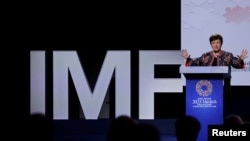“We're here, Africa,” IMF managing director Kristalina Georgieva said on a panel with African entrepreneurs.
Often lenders of last resort, the IMF and the World Bank use billions in loans and assistance to buoy struggling economies and encourage countries operating in deficit to implement reforms they say promote stability and growth.
Critics, however, including officials from throughout Africa, have said policies that deny economies access to credit and loans in the absence of balanced budgets often require governments to make impossible choices, including tax reform or making cuts to subsidies for food or energy.
Though the policies often intend to prevent countries from defaulting, keeping up with high interest loans in Africa means less money for critical needs, youth and infrastructure, said Nadia Fettah, Morocco's economy and finance minister.
“When we're having the conversation about how much financial resources are available, that we need to choose between food security and debt or climate finance and economic outside investment — we need both," she said. "Emerging countries need all of this, and the future of growth in the world needs growth in Africa.”
Ghazi Ben Ahmed, the founder of the Mediterranean Development Initiative, told VOA that "The IMF and the World bank have changed the way they're tackling problems in our region," adding "There is political willingness to give more comfort for countries in the South [sub-Sahar Africa] and more initiative and more [equal-to-equal discussion.]"
The criticism towards the World financial bodies came to a head during the pandemic, when wealthy countries pumped billions into keeping their economies afloat while poorer ones took on more debt.
“It’s a time of multiple crises, particularly for Arab and African countries who’ve been hit by various exogenous shocks not of their making,” said Iskander Erzini Vernoit, director of the Morocco-based Imal Initiative for Climate and Development. “There’s this massive financing gap on the order of trillions for developing countries and also the key question of how affordable the financing can be."
Those shocks include rising energy and food costs spurred by the war in Ukraine. The challenges are particularly pronounced in Africa, where many countries spend more on debt than health care and education combined.
Ahmed said that the IMF interest rate is not the problem but rather "the political will to implement the reforms."
Meanwhile, in the shadow of a deadly earthquake in Morocco, the IMF approved a $1.3 billion loan last month, a small fraction of the $11.7 billion the North African nation has estimated to repair earthquake damage.
The North African country is a longtime borrower that has used loans and credit to weather economic downturns, including most recently when the pandemic hit tourism and exports particularly hard. The institution has pushed Morocco to balance its budget and continue raising interest rates.
Morocco has experienced rapid development in its major cities, constructing world-class infrastructure that includes renovating airports, repaving roads and building a new high-speed rail.
Signs of the country’s rapid economic development are on display during the meetings in Marrakech, where attendees were welcomed with a video describing Morocco as a place where “institutional continuity and sound leadership of the country's affairs have fostered progress and speeded development."
But the transformation remains uneven. Far from the meeting's air-conditioned and carpeted tents, in earthquake-hit mountain villages, roads remain unpaved, water can be scarce and jobs are hard to come by.
The disaster, residents say, exacerbated disparities plaguing rural areas and compounded struggles facing already-impoverished communities.
Laid-off miner Brahim Ait Brahim — who lives in Anerni, a mountain village near the quake's epicenter — said he's still waiting for emergency financial and housing assistance one month after his house was destroyed in the earthquake.
“That’s Marrakech. It’s the capital for tourism,” Ait Brahim said, describing it as the face of Morocco. “Here’s it’s hidden behind.”
VOA's Paul Ndiho contributed to this report and some information came from The Associated Press.

Forum